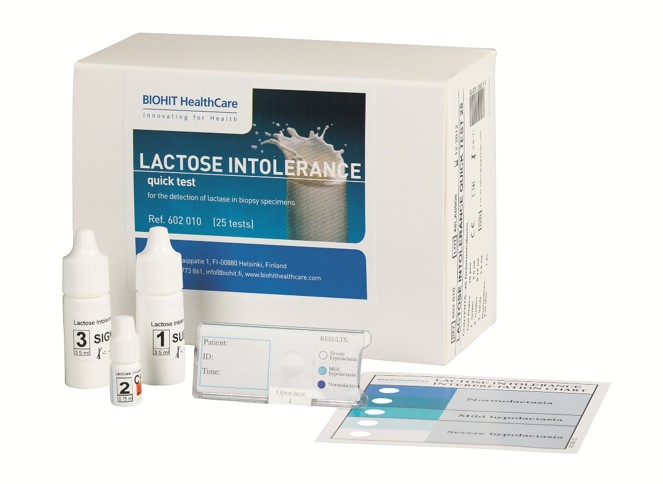INFORMATION
The BIOHIT Lactose Intolerance Quick Test was developed to support the diagnosis of lactose intolerance (hypolactasia of the small intestine) by detecting the activity of lactase enzyme in a duodenal biopsy specimen.
Used in conjunction with Gastroscopy (oesophago-gastroduodenoscopy (OGD)) a single biopsy specimen taken from the mucosa of the upper part of the small intestine is examined immediately. By the addition of three reagents the Lactose Intolerance Quick Test reveals the amount of Lactase enzyme activity in the biopsy by a colour change. The development of colour in the test liquid after 20 minutes informs the endoscopist whether or not the lactase enzyme is present in the biopsy specimen.
Each Lactose Intolerance Quick Test Kit contains:
Three Reagents
Test Plates
Colour chart for interpretation
Lactose Intolerance Quick Test Benefits
Biopsy sample can be tested immediately
No special equipment or training needed
Measures lactase activity directly
Simple procedure with results in 20 minutes
Severe hypolactasia can be differentiated from mild hypolactasia
FEATURES
Rapid biopsy test for Lactase deficiency (lactose intolerance)
20 minute test
Perfomed in conjunction with gastroscopy
Semi-quantitative results:
Severe hypolactasia / alactasia
Mild hypolactasia
Normolactasia
Requires single D2 (post bulbar) biopsy
Sensitivity 95%, Specificity 100% (n=100 compared to gold standard)
Two kit sizes availble:
25 tests (Product Code 602010)
10 tests (Product Code 602012)
Positive control available (Product Code 602018)
BENEFITS
Rapid diagnosis of a high prevalence condition
Provides a direct and highly specific measure of lactase activity
Use to report lactase expression as a functional assessment
Predicts clinical response to a lactose free diet
Rules out lactose intolerance as a cause of functional gastrointestinal disorders
More accurate that alternative methods
Identifies primary, secondary, congenital and familial Lactase deficiency

